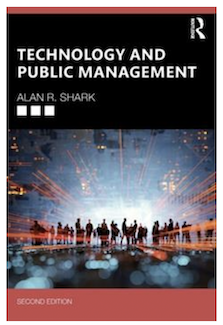
Teaching Technology & Public Management – The Need Has Never Been Greater

Perhaps more importantly, Dr. Shark highlights how public administrators can leverage technology in their work, enabling greater effectiveness for the people served by government programs and civil society advocacy. The text tracks the evolution of key topics in managing technology that range from mobile devices and broadband access to cybersecurity and privacy. Readers will learn both foundational content and practical applications that they can adapt in their own work. Dr. Shark's text leaves the field of public administration in a better place." Dan Chenok, Executive Director, IBM Center for The Business of Government
Though I never intended to become a (part-time) professor, an opportunity presented itself when I met an influential and highly respected dean of a school of public affairs and administration. While enjoying a meal together, I mentioned something I had been saying for some time, “how can a student of public affairs or administration go through a Master’s degree program without a healthy understanding of the tools that technology offers? Be careful about what you wish! His response was “...I completely agree, and I have a course waiting for you!” That was in 2009 and I have been teaching ever since. But as I looked around there was no single textbook that would help students of government understand technology, how to manage it, and to at least feel comfortable in asking the right questions. This led to the first edition of Technology and Public Management that was published in 2015. And so much has changed since then. As 2023 begins, I am pleased to say that the second edition of Technology & Public Management is now available.
The focus of this text is on public management and information technology—how technology and public policy intersect at nearly every turn. Public managers may find themselves working with the private sector in various roles: procuring technology services, managing government contracts or contractors, or developing the rationale for how technology programs should be regulated or funded through grants or contracts. Public managers, many of whom may never have studied the growth and use of technology, often find themselves developing new rules and regulations that govern technology.
Few would disagree that with modern technological tools, public managers can perform tasks faster, easier, more effectively, efficiently, and almost always—if carried out correctly—with less overall cost. The federal government spends approximately $93 billion annually on technology, and that number does not count classified expenditures. State and local governments spend a combined $118+ billion per year. Governments at all levels play a significant role in using technology and, at the same time, perform a leading role in research and development aimed at improving it.
In today’s public management arena, technology is well-dispersed and technology is no longer in the single domain of the chief technology or information officers, or of IT or MIS departments. In today's environment, more is expected of public managers. Public managers have the added challenge of staying on top of their specialty in addition to keeping up with the latest tools that they increasingly must rely on. Moreover, the rules and policies governing those tools are constantly changing. Finally, there is an ongoing challenge to ensure that any technology used is deployed for the right reason, cost-justified, and secured against all types of threats. Today's technology toolbox offers public managers essential tools to improve service delivery—both for satisfying internal requirements as well as realizing external efficiencies. Just as auto mechanics would find it impossible to work on a car without a good set of tools, public managers face similar challenges in today's contemporary office and mobile environment. Today more than ever, they must also possess a mastery of modern information management tools.
One of the greatest weaknesses of the public administration curriculum is it has remained static with the same core required courses coupled with an unsustainable number of electives. The oversupply of electives often leads to courses of 10 or less students who struggle to cobble together a meaningful program. Too much weight is placed on tradition-bound theory and less on practice. This leaves public managers without the high-level skills necessary to succeed and be able to quickly adapt to a for-ever changing dynamic workspace. Senior public managers have complained for some time regarding the quality of new MPA students who appear to lack some of the most fundamental professional skills. In a number of cases, these same critics seek out graduates from other disciplines.
Emerging tech such as AI, blockchain, coupled with advances in data management and governance are critical knowledge areas that are necessary towards being a productive manager. But there is more, students need to better understand and appreciate the current trends in citizen/resident facing services as the trend towards digital transformation never ends. As importantly students need to be better attuned to the latest trends, opportunities, and pitfalls to avoid – including digital ethics.
Over the years we have witnessed some colossal tech failures. Much of the failures stem from working with now-ancient legacy systems to more recent failures where most can be attributed to the failing of public managers – not the technology itself. And with each failure, public trust further erodes let alone the waste of scarce financial resources. I am not alone in advocating for a form of “public technology courses” to be required and clearly no one book can come close to addressing many of the issues raised here, but it is a start.



